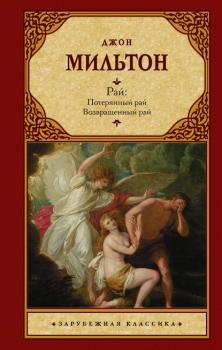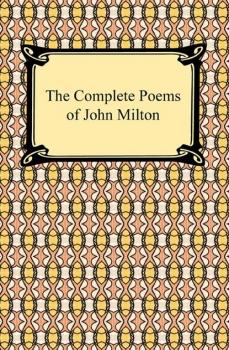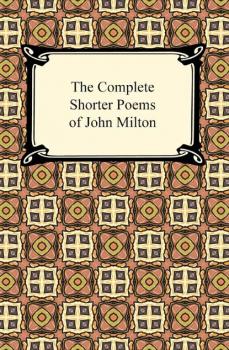ТОП просматриваемых книг сайта:
Джон Мильтон
Список книг автора Джон МильтонАннотация
HarperCollins is proud to present its new range of best-loved, essential classics.‘Greedily she engorged without restraint,And knew not eating death;’Milton’s Paradise Lost is a poem of epic proportions that tells of Satan’s attempts to mislead Eve into disobeying God in the Garden of Eden, by eating from the tree of knowledge. His interpretation of the biblical story of Genesis is vivid and intense in its language, justifying the actions of God to men. In his sequel poem, Paradise Regained, Milton shows Satan trying to seduce Jesus in a similar way to Eve, but ultimately failing as Jesus remains steadfast.
Аннотация
«Потерянный рай» – гениальная поэма Мильтона, благодаря которой он стал одним из известнейших английских поэтов своего времени. Поэма основана на библейском сюжете падения человека и изгнания его из Рая. Как писал Мильтон в Книге Первой, его цель состояла в том, чтобы оправдать путь Бога людям (в оригинале «justify the ways of God to men»).
«Возвращенный рай» является продолжением «Потерянного рая». Поэма повествует об искушении Иисуса Христа Сатаной во время пребывания в пустыне.
«Потерянный рай» представлен в переводе Николая Холодковского, а «Возвращенный рай» – Ольги Чюминой.
Аннотация
John Milton, the 17th century English poet author, polemicist and civil servant for the Commonwealth of England is of course known best for his famous epic poem «Paradise Lost» which retells the biblical story of «The Fall of Man» and how Adam and Eve were tempted by Satan and ultimately expelled from the Garden of Eden. «Paradise Lost» is included in this volume of «The Complete Poems of John Milton» along with its sequel «Paradise Regained» and thirty-nine additional poems.
Аннотация
Contained in this volume are two great works by the English Poet John Milton, «Paradise Lost» and «Paradise Regained». Milton's «Paradise Lost» is considered to be one of the most classic epic poems ever written. It is a retelling of the biblical story of the Genesis of man, of Adam and Eve in the Garden of Eden, and of how Eve when tempted by Satan disobeyed God and ate from the tree of knowledge. Written in 1667, «Paradise Lost» is a poetic and intriguing interpretation of ancient biblical legend. Following the fall of Adam and Eve from the Garden of Eden in Milton's «Paradise Lost», Milton turns his attention to the temptation of Jesus in the wilderness by Satan in «Paradise Regained». In this work, a sequel to «Paradise Lost», Satan tests Jesus in a similar way to Eve in the Garden of Eden. However, Jesus is not seduced by the promises of Satan and passes his test. «Paradise Regained» is a poetic and intriguing tale that follows along in the spirit of Milton's masterpiece «Paradise Lost».
Аннотация
Milton's «Paradise Lost» is considered to be one of the most classic epic poems ever written. It is a retelling of the biblical story of the Genesis of man, of Adam and Eve in the Garden of Eden, and of how Eve when tempted by Satan disobeyed God and ate from the tree of knowledge. Written in 1667 by the English Poet John Milton, «Paradise Lost» is a poetic and intriguing interpretation of ancient biblical legend.
Аннотация
John Milton is most famously remembered for his epic narrative «Paradise Lost» and its sequel «Paradise Regained». In addition to these classic works Milton wrote several shorter pieces. These shorter works are collected together in this volume and include the following: On the Morning of Christ's Nativity; A Paraphrase on Psalm CXIV; Psalm CXXXVI; On the Death of a Fair Infant Dying of a Cough; At a Vacation Exercise in the College, Part Latin, Part English; The Passion; On Shakespeare; On the University Carrier; Another on the Same; An Epitaph on the marchioness of Winchester; On His Being Arrived to the Age of Twenty-Three; L'Allegro; Il Penseroso; Sonnet to the Nightingale; Song on May Morning; On Time; At a Solemn Music; Upon the Circumcision; Arcades; Comus, a Mask; Lycidas; When the Assault was Intended to the City; To a Virtuous Young Lady; To the Lady Margaret Ley; On the Detraction which Followed upon my Writing Certain Treatises; On the Same; On the New Forcers of Conscience under the Long Parliament; To Mr. H. Lawes on His Airs; On the Religious Memory of Mrs. Catherine Thomson, my Christian Friend, deceased Dec. 16, 1646; On the Lord General Fairfax at the Siege of Colchester; To the Lord General Cromwell, on the Proposals of Certain Ministers at the Committee for the Propagation of the Gospel; To Sir Henry Vane the Younger; On the Late Massacre in Piemont; On His Blindness; To Mr. Lawrence; To Cyriack Skinner; To the Same; On his Deceased Wife; Milton’s Introduction to Samson Agonistes; and Samson Agonistes.
Аннотация
Milton's great 17th-century epic draws upon Bible stories and classical mythology to explore the meaning of existence, as understood by people of the Western world. Its roots lie in the Genesis account of the world's creation and the first humans; its focus is a poetic interpretation «Of Man's first disobedience, and the fruit / Of that forbidden tree whose mortal taste / Brought death into the world, and all our woe / With loss of Eden.»In sublime poetry of extraordinary beauty, Milton's poem references tales from Ovid's Metamorphoses, the Iliad and Odyssey, and Virgil's Aeneid. But one need not be a classical scholar to appreciate Paradise Lost. In addition to its imaginative use of language, the poem features a powerful and sympathetic portrait of Lucifer, the rebel angel who frequently outshines his moral superiors. With Milton's deft use of irony, the devil makes evil appear good, just as satanic practices may seem attractive at first glance.Paradise Lost has exercised enormous influence on generations of artists and their works, ranging from the Romantic poets William Blake and Percy Bysshe Shelley to Joseph Haydn's oratorio The Creation and J. R. R. Tolkien's The Lord of the Rings.
Информация о книге
Автор произведения Джон Мильтон
Жанр Зарубежные стихи
Серия Dover Thrift Editions
Аннотация
‘Here at least we shall be free. Better to reign in Hell, than serve in Heaven…’ Defeated in battle and exiled from heaven, Satan burns in a lake of fire with his army of rebels around him. Consumed with envy, he plots his bitter revenge – to destroy God’s delight in his newest creation. During his hunt for Paradise on Earth, Satan sweet-talks his way out of hell and tricks his way across the universe to tempt Eve and seduce humanity. Paradise Lost, the greatest epic poem in the English language, is a richly theatrical vision of the Fall of Mankind. This version was produced by the Oxford Stage Company and toured throughout the UK in April 2006.
Аннотация
Following the fall of Adam and Eve from the Garden of Eden in Milton's «Paradise Lost», Milton turns his attention to the temptation of Jesus in the wilderness by Satan in «Paradise Regained». In this work, a sequel to «Paradise Lost», Satan tests Jesus in a similar way to Eve in the Garden of Eden. However, Jesus is not seduced by the promises of Satan and passes his test. «Paradise Regained» is a poetic and intriguing tale that follows along in the spirit of Milton's masterpiece «Paradise Lost».
Аннотация
English poet John Milton’s 17th century epic poem, “Paradise Lost,” is the work for which he is best known and which would solidify his reputation as one of the greatest poets of all time. A classic retelling of Biblical legend, the poem relates the stories of the war in heaven, the fall of man, and the temptation of Adam and Eve in the Garden of Eden. First depicted in Revelation, Milton portrays the angel Lucifer’s denial of God’s authority over him and the failed rebellion that he leads as a consequence of this belief. Lucifer is cast out of Heaven and into Hell by God for his betrayal. The temptation of Adam and Eve by Satan and their subsequent fall from innocence forms the other major narrative arc in “Paradise Lost.” As described in the work by Milton his purpose in writing this epic masterpiece was to “justify the ways of God to men.” Milton’s work is one of sublime and extraordinary beauty which has inspired readers and been analyzed by critics ever since its original publication in 1667. This edition includes an introduction by M. Macmillan.










